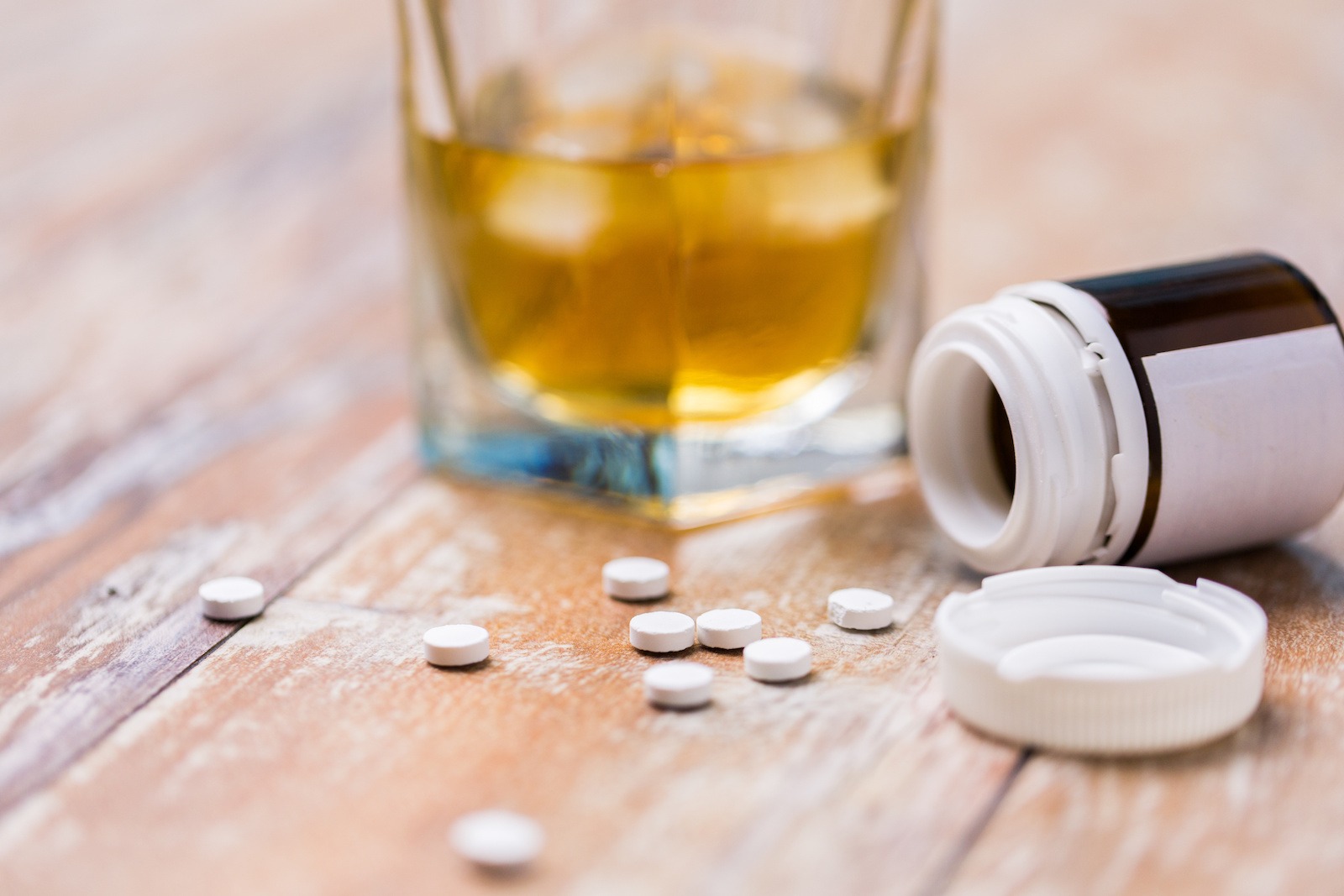Addiction | 6 min read
Why You Never Want To Mix Hydrocodone and Alcohol Together & The Side Effects of Doing So
Medically Reviewed By

On August 28, 2022
Written By
On December 10, 2021

Every day, there is more and more proof that the opioid scourge in our country isn’t going anywhere. Opioids are the most frequently abused prescription type in the US and are responsible for destroying countless lives each year, along with friends and family left in their wake. Due in no small part to the constant prevalence of opioid prescriptions, they remain the most abused year after year, with prescriptions for and abuse of Hydrocodone at the top of the list.
Hydrocodone is a synthetic opioid derived from the components of the opium poppy. It is marketed and produced to treat moderate to severe levels of pain all over the body in situations where other pain treatments are not working or not working enough to be of any consequence.
It is often sold under the brand name Vicodin and is most commonly used for pain management following injury or minor surgical procedures. It is only considered when a short-term pain reliever will be needed, specifically because it is known for building a strong chemical dependency if taken consistently for a long period.
Alongside this seemingly endless epidemic of prescription abuse and overdose is the incredibly common abuse of alcohol in this country. Most people don’t think twice about going out with the rest of the office on a Friday night or having a couple of drinks when they get home after work, but this tendency to have nearly instant access to alcohol and binge drinking is creating more opportunities for abuse. In addition, having the substance available at most gas stations, restaurants, and recreational venues fosters a constant association of alcohol with leisure.
Side Effects of Hydrocodone and Alcohol
Both hydrocodone and alcohol have a wide range of side effects, some being much more serious than others. In some cases, certain symptoms may cause medical concern if they linger too long or worsen.
Side Effects Of Hydrocodone
The most common side effects of hydrocodone include:
- Muscle Tension
- Uncontrollable Tremors
- Stomach Pain
- Tiredness
- Headache
- Backache
- Dry Mouth
- Tinnitus
- Difficult & Painful Urination
- Difficulty Sleeping
- Swelling Of Feet & Ankles
More serious side effects are also possible and require immediate attention. If any of the following symptoms are experienced, it will likely require life-saving emergency medical attention:
- Itching
- Hives
- Facial Swelling
- Hoarseness
- Difficulty Swallowing
- Chest Pain
- Difficulty Breathing
- Slowed Or Irregular Heartbeat
- Nausea & Vomiting
- Diarrhea
- Unable To Get An Erection
- Irregular Menstruation
- Agitation
- Hallucinations
- Fever, Sweating, & Shivering
Side Effects Of Alcohol
While the side effects of alcohol are often thought to be far less severe than other commonly abused substances, they can be incredibly serious nonetheless. Some of the most common side effects of taking alcohol include:
- Drowsiness
- Blurred Vision
- Distorted Hearing
- Slurred Speech
- Nausea
- Vomiting
- Severely Impaired Judgement
- Reduced Perception
- Dramatic Loss Of Coordination
- Trouble Breathing
- Diarrhea
- Loss Of Consciousness
- Blackouts & Memory Damage
- Coma
- Anemia
More serious side effects are often seen as the effects of drinking large amounts consistently or drinking heavily for prolonged periods. Side effects in these cases can include:
- Unintentional Injuries
- Intentional Injuries
- Job Difficulties
- Relationship Difficulties
- Alcohol Poisoning
- Stroke
- High Blood Pressure
- Liver Damage
- Nerve Damage
- Diminished Libido
- Brain Damage
- Vitamin Deficiencies
- Ulcers
- Malnutrition
- Gastritis
- Cancer
What Can Happen When You Mix Hydrocodone and Alcohol Together
One of the most significant risks, when you mix hydrocodone and alcohol is that you can create a very high potential for an overdose. When they are first taken, however, there are immediate, very pleasurable feelings. The user will initially feel euphoria, relatively strong numbness, and slight drowsiness.
While the user is caught up in the feelings of being high, the substances are taking a very large toll on the body that cannot be felt or noticed immediately. In addition, when hydrocodone and alcohol are taken together, they create a synergistic effect and make each other stronger. This can lead to the individual losing control and coordination of their body quickly.
Both hydrocodone and alcohol are powerful central nervous system depressants, which slow down the messaging activity between the brain and the central nervous system to a large degree. This can lead to extremely dangerous effects, such as respiratory depression and slowed heart rate, resulting in not just loss of consciousness but coma and even death.
Another potentially deadly result of mixing hydrocodone and alcohol is that hydrocodone has a very similar effect as alcohol when it comes to suppressing inhibitions. This can exacerbate the reduction of decision-making skills that happens while drinking, leading to drinking too much or taking too much hydrocodone. This is a prime recipe for an overdose since the user will likely take far more of both substances than they ordinarily would.
Hydrocodone is also very frequently formulated with varying doses of acetaminophen, leading longtime users and heavy users to experience significant liver damage, ulcers, and internal bleeding. Using a combination of hydrocodone and alcohol over time can cause permanent damage to many of the body’s systems.
Hydrocodone and Alcohol Withdrawal Symptoms & Timeline
Since hydrocodone and alcohol are two similar yet very different substances, an individual going through a detox stage for both substances can expect a very intense and difficult withdrawal. However, how the detox will progress and the specific mix of symptoms that the individual may experience will depend on countless other variables and will be unique to that individual.
Hydrocodone Withdrawal Symptoms & Timeline
Since hydrocodone affects the same pain receptors in the brain as other opioids like fentanyl, morphine, and heroin, it has the potential to begin building dependency and addiction after consistent use for just a week. This means that using it for only a few days of legitimate prescription use can still result in withdrawal symptoms appearing when use is discontinued. The withdrawal length and strength will also depend on the type of hydrocodone formulation used.
Individuals using short-acting formulations can begin to feel the onset of withdrawal symptoms in as little as 4-6 hours after the last dose and last for up to two weeks. Those that use long-acting formulations will typically see their withdrawals begin within 3 days of stopping the pills and can last for up to a month before symptoms subside considerably.
The most commonly reported symptoms of hydrocodone withdrawal include anxiety, agitation, irritability, diarrhea, dilated pupils, depression, insomnia, muscle and joint soreness, fever, nausea, vomiting, uncontrollable sweating, yawning, and runny nose. Most individuals going through hydrocodone withdrawal will generally experience several, if not many, symptoms. However, some individuals experience either fewer or more than average symptoms.
In some cases, there will be the option for medical detox, where a drug is used that forces the opioids from the receptors and jumpstarts the entire process. When medical detox is used, situations can be incredibly jarring and begin the withdrawals in just 6-12 hours. If medical detox is not used, the user will need to endure 4-5 half-lives or between 16 and 24 hours for the remaining hydrocodone to be metabolized and removed from the system.
The most uncomfortable and intense physical symptoms will often peak about halfway through the first week of the process. Following the end of the first week, the symptoms will taper off and fade away relatively quickly, often being gone by the end of the second week.
Alcohol Withdrawal Symptoms & Timeline
The withdrawal symptoms from alcohol are often quite significant for a substance you can buy nearly anywhere. The potent nervous system depression that alcohol causes quickly causes the brain to acclimate and become accustomed to the slower pace. Once alcohol consumption is stopped, the brain and central nervous system are suddenly flooded with activity at levels that are no longer seen.
This new activity causes an extreme and often painful shortage of vital neurotransmitters. This is one of the initial causes of the withdrawal process. This process will often be relatively unique to the individual going through recovery since there are many variables at work.
The most common symptoms of alcohol withdrawal include anxiety, emotional instability and mood swings, depression, shaking, tremors, fatigue, diminished appetite, difficulty concentrating and focusing, disruptions to sleep cycles, elevated heart rate, sweating, nausea, and pale appearance.
The timeline for alcohol detox can begin as soon as just one hour after the last drink for many people. The physical symptoms will ramp up and peak within a week, then taper off over the month following.
How To Get Help For a Hydrocodone Or Alcohol Addiction
If you or someone you love needs help with hydrocodone and alcohol addiction, reach out today to our qualified local addiction experts. By working with professionals in a medically supervised environment, recovery can begin in a safe and productive environment, helping to build a foundation for future health and long-term recovery.
Was this article helpful? Follow our blog for more information about substance use, addiction, and recovery. Recent posts include topics such as college drinking and recovery month.
Ascendant New York Editorial Guidelines
Here at Ascendant New York, we understand the importance of having access to accurate medical information you can trust, especially when you or a loved one is suffering from addiction. Find out more on our policy.
- Opioids. In: LiverTox: Clinical and Research Information on Drug-Induced Liver Injury. National Institute of Diabetes and Digestive and Kidney Diseases; 2012. Accessed August 28, 2022. http://www.ncbi.nlm.nih.gov/books/NBK547864/





